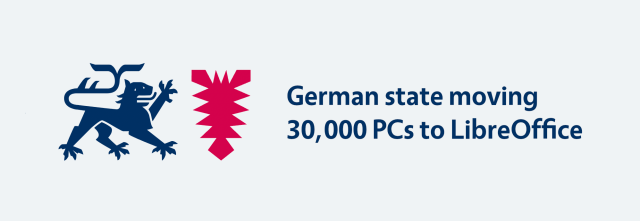Question! Why should local governments use taxpayers’ money to buy proprietary, closed software from a single vendor? And what happens to citizens' data? A solution is to move to free and open source software like #Linux and #LibreOffice – which is exactly what Schleswig-Holstein is doing: blog.documentfoundation.org/bl… #foss #OpenSource #privacy
German state moving 30,000 PCs to LibreOffice - The Document Foundation Blog
Following a successful pilot project, the northern German federal state of Schleswig-Holstein has decided to move from Microsoft Windows and Microsoft Office to Linux and LibreOffice (and other free and open source software) on the 30,000 PCs used in…Mike Saunders (The Document Foundation)
reshared this

Paul Wunderlich
in reply to LibreOffice • • •in_sympathy
in reply to LibreOffice • • •Jan Vlug
in reply to LibreOffice • • •Zeki Çatav 🤔 ☕ 🕯️🎶
in reply to LibreOffice • • •LiMux
LibreOffice
in reply to Zeki Çatav 🤔 ☕ 🕯️🎶 • • •Tavo
in reply to LibreOffice • • •Moth
in reply to LibreOffice • • •Víktor Bautista i Roca
in reply to LibreOffice • • •@catavz
The article is over one year old. How has everything evolved?
Hacker
in reply to LibreOffice • • •Guido Günther
in reply to LibreOffice • • •That is great to hear! Please brace for the political backlash and constant and continuous lobbying of proprietary software vendors.
That's what in the end brought down earlier attempts in e.g. Munich (#LiMux) or the German Federal Foreign Office.
torspedia
in reply to LibreOffice • • •François Ferron 🇪🇺 🔷️🔶️
in reply to LibreOffice • • •Cloud68.co 🟣
in reply to LibreOffice • • •Number6
in reply to LibreOffice • • •Not that I would defend M$, but the cost of the operating system and the software is a fraction of the cost of the machines it runs and and the personnel that use it.
Retraining thousands of employees to use Open source products might be more expensive than the cost of the operating system & software.
Then there's the problem that almost always there will be essential software that only runs on MS desktops.
And then there's hardware compatibility issues.
Moritz Mühlenhoff
in reply to LibreOffice • • •LibreOffice in business | LibreOffice - Free Office Suite - Based on OpenOffice - Compatible with Microsoft
www.libreoffice.orgThe Incredible G
in reply to LibreOffice • • •Simon Dückert
in reply to LibreOffice • • •Axel Stieglbauer
in reply to LibreOffice • • •Douglas @revdjenk Jenkins
in reply to LibreOffice • • •LibreOffice
Unknown parent • • •LibreOffice in business | LibreOffice - Free Office Suite - Based on OpenOffice - Compatible with Microsoft
www.libreoffice.orgLibreOffice
Unknown parent • • •LibreOffice Online | LibreOffice - Free Office Suite - Based on OpenOffice - Compatible with Microsoft
www.libreoffice.orgTim Ward ⭐🇪🇺🔶 #FBPE
in reply to LibreOffice • • •